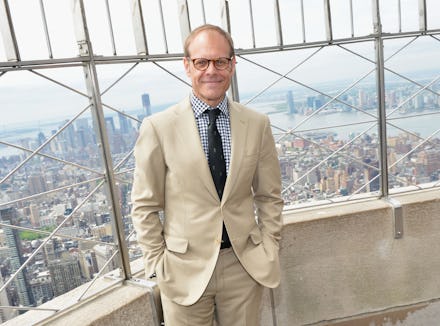Why it cuts so deep when your favorite celebrity lets you down

I love television brainiacs, especially ones who can cook. For a decent stint of time, I admired the Food Network’s Alton Brown, a practical scientist with a lab in the kitchen. The chef and author’s knowledge of food and his penchant for accessorizing made me believe that our values were more aligned. But recently, Brown made a (and this is a very grand and intentional understatement) “snafu” on Twitter: A joke about the Holocaust, in the context of election results. I won’t even dignify it by explaining further.
That isn't the only problematic thing he's said or done but that one definitely pushed it over the edge for me. Brown clearly isn’t who I thought he was. The “real” him chipped away at the paragon status he held in my brain and weirdly, it feels like a breakup or a long farewell, even if I didn’t even know him personally. When celebrities or high-profile idols let us down, why does it feel so shitty? And how do you deal with the loss?
To be fair, my idols don’t need to think exactly like me 100% of the time in order to garner my reverence. But Brown went too far and it cut deeply, especially as a nerd of color. Ah the pitfalls of idealization — in 2020, especially, it’s a gamble. Many celebs have acted a fool this year, disappointing us when we looked to them for some sort of comfort or motivation. And instead of pretending like I’m too mature to be affected by this, I reached out to an expert about how to cope with the strange feeling of losing an idol because they turned out to be a bit of a (or a huge) jerk.
“You took a dimensioned, real human being and essentially stereotyped them,” says Petros Levounis, professor and chair of the department of psychiatry at Rutgers New Jersey Medical School. “You were making a caricature of him — a two dimensional cardboard image of what you want him to be, instead of a full blown human being.” Apparently, I had I had created this infallible version of a human and when he said something problematic, this flaw totally caught me off guard. This isn't just a phenomenon that happens with celebrities, though. We create ideas, in our minds, about every person we meet. How lofty they are depend on your perception as well as who or what is influencing you.
A way of coping with our own fears or anxieties about others is that we usually give strangers the benefit of the doubt until they prove otherwise. Sometimes we go too far and we think that, for instance a politician can be correct about every single stance she or he takes. The rational pat of you, on some level, knows that you agree with some stances and have the freedom to disagree with others. But when you're blindly all in all the time, that’s called idealization. Knowing the difference between admiration and obsession will keep your real world views of people in check.
Our expectations of ourselves split us into two — the ideal self (“what I would like to be”) and the real self (“what I really am”). For every person we meet, we do this as well, splitting them into the real person they are and who we expect them to be. Eminem’s Stan, actually, counts as a pithy and spot-on psychological lesson on the ideal self.
Larger than life figures take our focus, and it's not just a problem when they disappoint us with their fuckery. Our idolizing can also impact our real life relationships with others negatively. “We do a disservice to other human beings by reducing them to only the ideal ones," says Levounis. Putting regular people on a pedestal, essentially, robs them of their right to make mistakes. Hopefully, though, the non-celebrity people in your life don't say racist things, which is...more than a mistake.
When a star instantly goes from idol to problematic for you, the brain is just doing its job. It can hurt, though, to suddenly become aware of an uncomfortable reality you've shielded yourself from the possibility of for so long. Healing from that takes time. Yes, delete that person from your music library, Twitter, or your DVR, but also use your brain to categorize what you liked about them in the first place. If their offense is not truly disgraceful, you have the option of enjoying some of their work but decide not to financially or publicly support them. Some say that there's degrees to cancel culture.
You also have the very great option of replacing your fallen idol with someone who deserves your admiration, and glean motivation from New Fave in a healthier way — by seeing them as a whole human. The sciences are teeming with less problematic folks, so a role model combo of science and food can’t be far I imagine. There are a few that come to mind, already — Emmymade in Japan, for example, is a gingham shirtwaist away from taking the Brown idol spot.
Ultimately, I don't hate Alton Brown. I don't know him, truly. From the outside, he’s still a good scientist albeit with Twitter-based thoughts I don’t need to follow. I’ll keep that in mind — and my imagination is dimensionless. In this dimension, I can just wear a bow-tie the next time I bake.